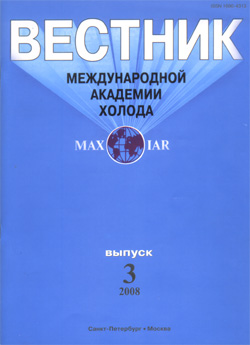
Influence of cooling on the quality of autumnal apples

Annotation
Nowadays considerable proportion of apples is exposed to thermal conservation after harvesting which results in the loss of biologically active agents. Using of artificial cold for preservation of vegetable production allows keeping its nutrition value and quality as much as possible. To define the technological modes of refrigerating conservation it is necessary to consider the quality of fruits, their chemical composition, structure, intensity of the exchange processes due to activity of enzymes and also the dynamics of macro- and the micronutrients which is crucial for nutrition and biological value of fruits. The aim of this research is to study influence of low positive and negative temperatures on the change of carbohydrate fraction, content of organic acids and activity of peroxidase during storage of autumnal apples. Apples of Antonovka and Autumn striped varieties grown up in the collection garden at Pavlovsk experimental station of Vavilov Institute were chosen as objects of research. The indicators of quality in question were defined by the standard physical and chemical and biochemical methods of the analysis. Apples were stored in the cooled and frozen state at temperatures of 3±1 degC and –18deg C respectively. After blanching apples were frozen at the temperature of –24deg C and –35 deg C up to the temperature of –18 deg C. On changing peroxidase enzyme activity technological parameters of blanching before freezing were chose: 0.5% of lemon acid solution is recommended at the temperature of 95±1 degСfor 90 seconds. Dependences of changes in mono - and disaccharide content, pectinaceous substances, the sum of free organic acids on cooling conditions and storage duration are estimated. The regression equations for these dependences are received. Duration of apple storage at low positive and negative temperatures is proved by quality indicators.
Keywords
Постоянный URL
Articles in current issue
- The influence of whey protein hydrolysate on organoleptic characteristics of oxygen cocktails basis
- Evaluation of varieties and hybrids of carrots on the suitability of fast-frozen products
- Influence of cooling on the quality of autumnal apples
- Phytochemical composotoin of chicory (Cichorium Intybus L.) products
- Biotechnology whole-smoked poultry products
- Starter cultures for obtaining curd whey with improved organoleptic properties
- Formula of functional jelly using local berries
- Heat transfer and pressure drop at refrigerant boiling in the plate coils
- Heat and hydrodynamic calculation of tube-in-tube heat-exchanger
- Determination of technological parameters of preheating of the polypropylene pipes for welding into the socket at low temperatures
- Centrifugal compression stage performance with fluorocarbon refrigerants of different conditional isentropic exponents
- Heat load calculation for the modules of combined type freezing units
- New methods of forecasting flow regimes for boiling refrigerant in macro- and minichannels
- Rankine cycle working fluid for the use of regasification cold
- Basis approximating functions selection to maximize heat transfer coefficient of water-propylene glycol electrolyte coolant
